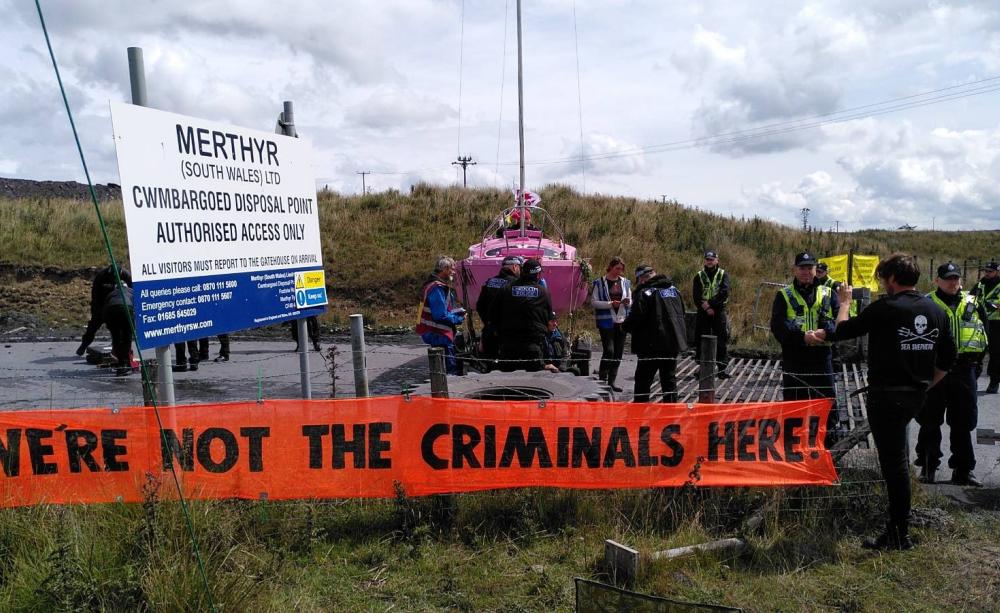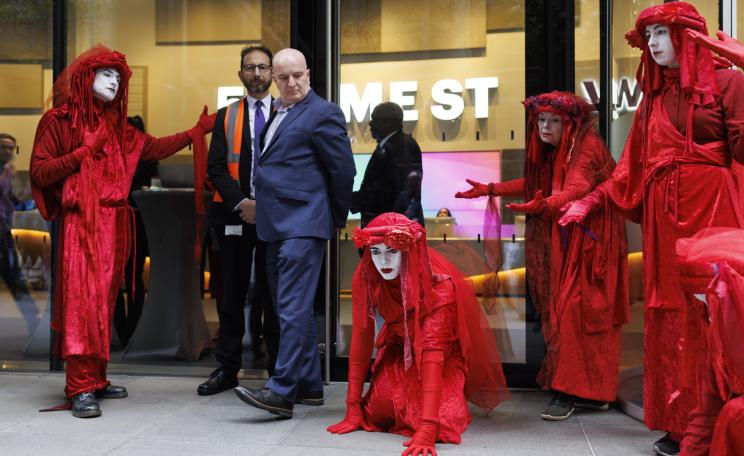If the government can come for a group that works this hard at peaceful protest, they can come for anyone.
The use of undercover surveillance, protection of energy infrastructure, and sanctions on fundraising and gathering are just some of the recommendations of a government-commissioned review of “extremism” that includes protest groups Extinction Rebellion (XR), Just Stop Oil, Black Lives Matters and Palestine Action.
The report was commissioned by James Cleverly, currently Home Secretary, who presented it as being “independent”. However, it was written by Lord Walney, is a paid adviser to lobbyists Rud Pederson, whose clients include oil and gas giant Glencore and the Purpose Business Coalition, whose members include BP.
He also chairs the Purpose Defence Coalition, whose members include Leonardo which is one of the world’s largest arms manufacturers and has links to the Israeli government. In January, he visited Israel as part of a UK delegation, paid for by Elnet, an organisation which seeks to strengthen ties between Europe and Israel.
Attack
The report was published the same day that the High Court ruled that Home Office had acted unlawfully when it lowered the threshold for police to impose conditions on peaceful protests from “serious disruption” to anything that caused “more than minor disturbance” last year, in a case bought by civil rights group Liberty. The government plans to appeal the ruling.
Green Party MP Caroline Lucas, who complained in Parliament about the fact that Lord Walney’s interests had not been flagged to the House of Commons as they had in the House of Lords, tweeted that the report was: “an assault on the fundamental democratic right to protest and an alarming step on the path to authoritarianism”.
A spokesperson from Just Stop Oil said that it did not recognise the legitimacy of Walney’s report. “His direct financial ties to the very companies whose profits are threatened by the groups he’s proposing to ban means he is entirely compromised. It is yet another case of open corruption,” he said.
In a statement, XR said that it was committed to non-violence, and trained everyone acting in its name in non-violence, a policy for clearing areas for emergency services, and stewards to manage crowds. These efforts were acknowledged in Walney’s report. “If the government can come for a group that works this hard at peaceful protest, they can come for anyone,” it said.
If the government can come for a group that works this hard at peaceful protest, they can come for anyone.
Will McCallum, co-executive director of Greenpeace tweeted that the report was “nothing short of a 300-page attack on democracy”, and that applying its recommendations would bring the UK “as close to becoming a police state as we've ever been,” he said. “The powers to stop violence already exist, this review wants to stifle our civil liberties,” he wrote.
Interfered
Tim Crosland, director of PlanB, pointed out that Walney’s work for the government had been “hugely influential”, with a recommendation he had made for a ban on masks at protests already coming into law.
“If everybody understood that he's being paid by the energy and oil industry, I don't think people would be taking it so seriously,” he said.
Walney formerly served as a Labour and then independent MP for Barrow and Furness from 2010 to 2019. He resigned from the Labour Party in 2018, which had suspended him following allegations of sexual harassment by a former staff member, which he denied.
Boris Johnson, prime minister at that time, made him a life peer in 2020, when he was also given the role of Special Envoy for Countering Violent Extremism. The role was “reshaped” to be Independent Adviser on Political Violence and Disruption in 2020 “due to the changes brought about by the pandemic”, according to a Home Office spokesperson.
In his report, Walney wrote that “extreme political activists are targeting core elements of Britain’s democracy, including elected representatives, the free press, and educational settings”. These tactics impacted the economy, targeting supply chains, fuel and energy, transport and businesses and industry, and interfered with ordinary citizens going about their daily lives, he said.
Undercover
Movements including environmental and anti-racism were part of a “far left subculture” which had anti-establishment and anarchist ideologies as “an inseparable part of their worldview”, he wrote. XR’s rhetoric on uprising and rebellion and “system change, not climate change”, was an example of its rooting in anarchy, he said. “By focusing its demands on the creation of a Citizen’s Assembly rather than adopting specific policy proposals, Extinction Rebellion has largely avoided scrutiny of its vision for the future,” he wrote.
Walney's recommendations to the government include:
- That central and local government must not engage with groups who “do not use legal means to secure change”, or who use intimidation or harassment;
- Restrictions on groups’ ability to organise or fundraise;
- Expansion of the grounds on which the police can block a protest from taking place;
- Buffer zones around energy and defence infrastructure and increased use of injunctions against activists targeting them;
- Compensation for members of the public and businesses disrupted by activism; and
- Forcing activist groups to contribute to policing when demonstrations are large and numerous.
It also recommended that the government should review whether the police should use undercover surveillance to prevent serious disruption during protests, while acknowledging that this was "clearly an area that draws controversy on civil liberties grounds".
The recommendation came in spite of evidence given by the police to the review, stating that there was “nervousness” around submitting requests to the Home Office for undercover policing due to the public perception that groups such as XR had a “decent” ideology.
Disruption
Officers in the Met Public Order Intelligence Unit, which is in charge of non-extremism public order concerns, had said that their remit does not meet the threshold for covert surveillance because it covered low-level offending. However, Walney argued that its threshold did not take into account the “wider erosion of the democratic process and social cohesion”.
In an interview on Sky News, Walney noted that though organisations such as Just Stop Oil and Palestine Action had “not yet” been judged to meet the threshold to be defined as terrorist organisations, they were using criminal tactics. “Proscription has worked in the terrorist context to be able to restrict the activities of certain organisations – it’s not perfect, but it can be an important tool,” he said.
Cleverly called Walney’s report “pertinent and considered”. In a letter to Walney, the government said it would consider the thresholds of imposing conditions on protests, including blocking them; putting greater responsibilities on protest organisers to manage and limit the potential for demonstrations to “descend into violence or disruption,” and to allow the policy to set conditions “in their jurisdictions beyond protests”.
The report was presented in the House of Commons under a procedure called a “motion for unopposed return”, exempting it from scrutiny by Parliament, while giving it "Parliamentary privilege", meaning that Walney cannot be sued for defamation.
A spokesperson for the Home Office said: “There are established rules for all independent advisors to government, and clear guidance is provided on required processes and codes of conduct.” Lord Walney’s office did not respond to a request for comment.
This Author
Catherine Early is a freelance environmental journalist and chief reporter for the Ecologist. She tweets at @Cat_Early76.







